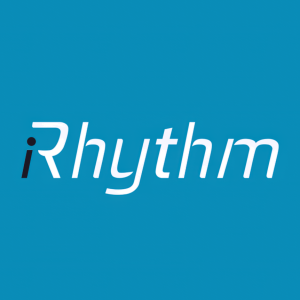AVALON Real-World Evidence Builds on CAMELOT Study Reinforcing iRhythm’s Zio LTCM Clinical Superiority
Rhea-AI Summary
iRhythm Technologies (NASDAQ:IRTC) announced groundbreaking results from the AVALON study, the largest real-world evaluation of ambulatory cardiac monitoring involving 428,707 commercially insured patients. The study, published in the American Journal of Managed Care, demonstrates the clinical superiority of iRhythm's Zio long-term continuous monitoring (LTCM) service.
The Zio LTCM service showed remarkable advantages over competitors, achieving the highest diagnostic yield (26.5%) compared to other monitoring services, fastest time to diagnosis (9 days), and lowest total healthcare costs ($10,476 per patient-year). The study revealed that Zio LTCM was up to 2.04 times more likely to diagnose arrhythmias compared to Holter monitors and demonstrated the lowest retest rate of 3.1% within 180 days.
Positive
- Highest diagnostic yield (26.5%) compared to competitors (14.7-18.4%)
- Fastest time to diagnosis at 9 days vs. 12-30 days for competitors
- Lowest total healthcare costs at $10,476 per patient-year
- Lowest retest rate at 3.1% compared to 6.2% for Holter monitors
- Reduced likelihood of cardiovascular events compared to all competitors
- Lower emergency department visits and hospitalizations
Negative
- None.
News Market Reaction
On the day this news was published, IRTC declined 1.65%, reflecting a mild negative market reaction. This price movement removed approximately $87M from the company's valuation, bringing the market cap to $5.16B at that time.
Data tracked by StockTitan Argus on the day of publication.
- In the largest real-world study of its kind with 428,707 patients, the Zio LTCM service outperformed other studied monitoring approaches in cardiac arrhythmia diagnostic yield, time to diagnosis, cardiovascular events, and total health care costs.
- Findings in a younger, commercially insured population build on data from the Medicare fee-for-service, population-based CAMELOT study, confirming the Zio LTCM service’s value across patient populations and payer segments.
SAN FRANCISCO, Aug. 18, 2025 (GLOBE NEWSWIRE) -- iRhythm Technologies, Inc. (NASDAQ:IRTC) announced the publication of the real-world evidence study: Assessment of Variation in AmbuLatory Cardiac MONitoring: Real-World Evidence of Commercially Insured Beneficiaries (AVALON) in the American Journal of Managed Care reinforcing the clinical superiority of the Zio® long-term continuous monitoring (LTCM) service.
Building on findings from the CAMELOT (Cardiac Ambulatory Monitor EvaLuation of Outcomes and Time to Events) study — published in the American Heart Journal — which demonstrated the clinical superiority of the Zio LTCM service among a Medicare population, the AVALON study evaluated a younger, commercially insured population (mean age: 46 years). Like CAMELOT, the AVALON data demonstrated that the Zio LTCM service was associated with the highest diagnostic yield compared to other studied ambulatory cardiac monitoring (ACM) modalities and all other LTCM services, and a lower likelihood of repeat testing compared to all other LTCM services. In AVALON, the investigators also found that the Zio LTCM service was associated with a lower likelihood of cardiovascular (CV) events compared to other studied ACM modalities and all other LTCM services, and was associated with a faster time to diagnoses, reduced health care resource utilization, and lower total health care costs during the follow-up period after monitoring — in the largest and most comprehensive real-world study of ambulatory cardiac monitoring among commercially insured adults.
“As the largest real-world study of its kind among commercially insured adults, AVALON underscores iRhythm’s commitment to delivering clinically meaningful innovation that also drives value across the healthcare system,” said Quentin Blackford, iRhythm President and CEO. “These results provide additional evidence reinforcing the clinical superiority of the Zio LTCM service, this time extending beyond a Medicare patient population.”
ACM is used to determine whether a patient has a cardiac arrhythmia, or abnormal heart rhythm, which affect up to
Key Findings
The investigators performed a retrospective cohort study examining national medical and pharmacy claims of 428,707 commercially insured U.S. patients without prior diagnosis of arrythmia or conduction disorders and who received an ACM for the first time. This represents the largest ever real-world comparative effectiveness evaluation of ambulatory cardiac monitoring. The findings demonstrated that Zio LTCM service, compared to other monitoring category modalities including Holter (≤ 48 hours) and external event recorder, was independently associated with the highest diagnostic yield, the fastest time to diagnosis, the lowest total health care costs, and the lowest rates of cardiovascular events. Moreover, when directly comparing Zio LTCM to other specific LTCM manufacturers and service providers, the Zio LTCM service was independently associated with the highest odds of new arrhythmias diagnosis at 90 days, lowest adjusted odds of retesting over the subsequent 6 months, and reduced adjusted odds of non-arrhythmia cardiovascular events.
The study compared the Zio LTCM service with Holter monitors, ambulatory event monitors (AEM), and other long-term continuous monitoring (LTCM) services from different manufacturers.
- Highest odds of arrhythmia diagnosis – New arrhythmia diagnosis — as documented in clinical encounter claims using ICD-10 codes for specified arrhythmias, within the first 90 days was highest for Zio LTCM service (
26.5% ), followed by non-iRhythm LTCM (18.4% ), AEM (17.0% ), and Holter monitoring (14.7% ).
The Zio LTCM service was associated with the highest adjusted odds of a new arrhythmia encounter diagnosis compared to other ACM modalities and all other LTCM services. Within 90 days, compared to Holter monitors, the Zio LTCM service was 2.04 times more likely. Compared to AEM, the Zio LTCM service was 1.69 times more likely. Compared to non-iRhythm LTCM services, the Zio LTCM service was 1.56 times more likely. Compared to Bardy LTCM service, the Zio LTCM service was 1.12 times more likely. Compared to LTCM services from BioTelemetry, the Zio LTCM service was 1.72 times more likely. Compared to LTCM services from Preventice, the Zio LTCM service was 1.69 times more likely. Compared to LTCM services from “Unclassified LTCM,” the Zio LTCM service was 1.61 times more likely to have a new arrhythmia encounter diagnosis.
- Lowest odds of retest – The Zio LTCM service demonstrated lower repeat testing within 180 days (
3.1% ) compared with Holter (6.2% ) and non-iRhythm LTCM (5.6% ). After accounting for patient characteristics, all other LTCM services were 1.95 times more likely to result in a retest. Retests for AEM were similar to those observed with the Zio LTCM service. Within the LTCM service category, retests were4.3% for LTCM services from Bardy,4.1% for LTCM services from BioTelemetry,3.8% for LTCM services from Preventice, and9.1% for LTCM services from “Unclassified LTCM.” - Faster time to diagnosis – The Zio LTCM service achieved a median time from end-of-wear to arrhythmia diagnosis of 9 days, compared with 21 days for non-iRhythm LTCM, 12 days for Holter, and 30 days for AEM. Within the LTCM service category, medians were 13 days for LTCM services from Bardy, 23 days for LTCM services from BioTelemetry, 25 days for LTCM services from Preventice, and 20 days for LTCM services from “Unclassified LTCM.”
- Fewer cardiovascular events – The Zio LTCM service was associated with the lowest likelihood of experiencing a cardiovascular event (e.g., cardiac arrest, myocardial infarction, stroke, or heart failure) within one year, compared with Holter and AEM. After accounting for patient characteristics, Holter was 1.13 times more likely and AEM was 1.21 times more likely to have a cardiovascular event. Within the LTCM service category, LTCM services from Bardy were 1.11 times more likely, from LTCM services from BioTelemetry 1.24 times more likely, LTCM services from Preventice 1.19 times more likely, and LTCM services from “Unclassified LTCM” 1.23 times more likely to have an event.
- Lower incremental healthcare resource utilization (HCRU) – The Zio LTCM service was associated with lower odds of emergency department visits, inpatient hospitalizations, and 30-day readmissions, compared with all other studied monitoring modalities during the 12 months following monitoring.
- Reduced total healthcare costs – The Zio LTCM service was associated with the lowest total medical and pharmacy costs in the 12 months following monitoring (
$10,476 per patient-year), compared with Holter ($11,042) , AEM ($11,492) , and non-iRhythm LTCM services ($11,293) .
*All associations reported here were adjusted and met statistical significance (p < 0.05).
“With over 400,000 patients, AVALON provides the clearest real-world evidence to date that the Zio LTCM service is associated with earlier diagnosis, greater sensitivity, higher encounter diagnosis, and clinically meaningful reductions in downstream retesting, events, and costs,” said Mintu Turakhia, MD, Chief Medical and Scientific Officer and EVP of Advanced Technologies at iRhythm. “These findings confirm in a broader U.S. population what we previously demonstrated in Medicare beneficiaries — not all cardiac monitoring is the same, and better data leads to better decisions, better outcomes, and greater value for patients and health care systems.”
Real-World Evidence of Value For Health Systems and Payors
Findings from the AVALON study show that the Zio LTCM service’s advantages can extend across diagnostic, clinical, and health care economic measures, delivering measurable benefits for clinicians, patients, health care systems, and payors
The Zio LTCM service’s advantages translate directly into lower health care resource utilization, including fewer emergency department visits, hospitalizations, and re-admissions, and the lowest total medical and pharmacy costs among all comparator groups. Together with the Medicare fee-for-service patient population-based CAMELOT (Cardiac Ambulatory Monitor EvaLuation of Outcomes and Time to Events) study published in the American Heart Journal, AVALON confirms the Zio LTCM service’s value across diverse patient populations and payer segments.
These published results add to iRhythm’s comprehensive clinical evidence program, encompassing more than 125 original research manuscripts,3 insights derived from over 2 billion hours of curated heartbeat data4 and more than 10 million patient reports posted since the company’s inception — underscoring an ongoing commitment to expanding evidence that supports improved patient outcomes.
About the AVALON study
The AVALON study was a claims-based retrospective cohort study of 428,707 arrhythmia-naïve adults with commercial insurance claims who received ambulatory cardiac monitoring between 2016 and 2024. Patients were stratified by monitoring modality (Holter, AEM, and LTCM) and by LTCM service manufacturers. The study evaluated arrhythmia encounter diagnosis through 90 days, time to diagnosis, retesting within 180 days, cardiovascular events within one year, and HCRU and costs during the 12 months following monitoring. The study was funded by iRhythm Technologies, Inc., and data procurement, cohort selection, data and outcomes definition, statistical analysis, and interpretation of results were independently performed by a third-party provider.
About iRhythm’s Zio LTCM Service
The Zio LTCM service consists of a prescription-only, patch-based ECG monitoring device that captures up to 14 days of continuous, uninterrupted data, and the ZEUS® (Zio ECG Utilization Software) system with an FDA-cleared AI algorithm clinically proven to perform at the level of cardiologists.5 The system delivers an end-of-wear report that is reviewed and validated by qualified cardiac technicians, with a
About iRhythm Technologies
iRhythm is a leading digital health care company that creates trusted solutions that detect, predict, and prevent disease. Combining wearable biosensors and cloud-based data analytics with powerful proprietary algorithms, iRhythm distills data from millions of heartbeats into clinically actionable information. Through a relentless focus on patient care, iRhythm’s vision is to deliver better data, better insights, and better health for all. To learn more about iRhythm and its Zio® portfolio of products and services, please visit https://www.irhythmtech.com/.
Media Contact
Kassandra Perry
irhythm@highwirepr.com
Investor Contact
Stephanie Zhadkevich
investors@irhythmtech.com
1 Desai et al. Arrhythmias. StatPearls [Internet], 2023. https://www.ncbi.nlm.nih.gov/books/NBK558923/.
2 Ataklte et al. Meta-analysis of ventricular premature complexes and their relation to cardiac mortality in general populations. The American Journal of Cardiology, 2013.
3 Data on file. iRhythm Technologies, 2025.
4 Data on file. iRhythm Technologies, 2024.
5 Hannun et al. Cardiologist-level arrhythmia detection and classification in ambulatory electrocardiograms using a deep neural network. Nat Med. 2019;25:65-69. https://doi.org/10.1038/s41591-018-0268-3
6








